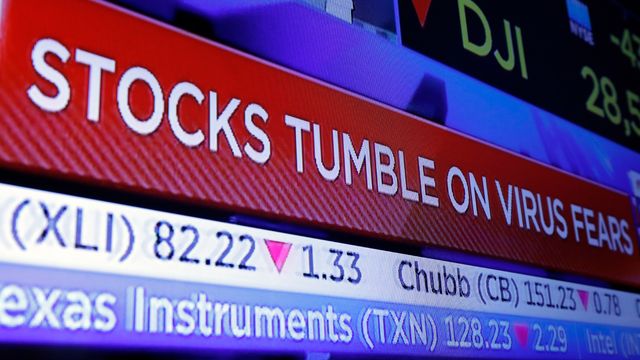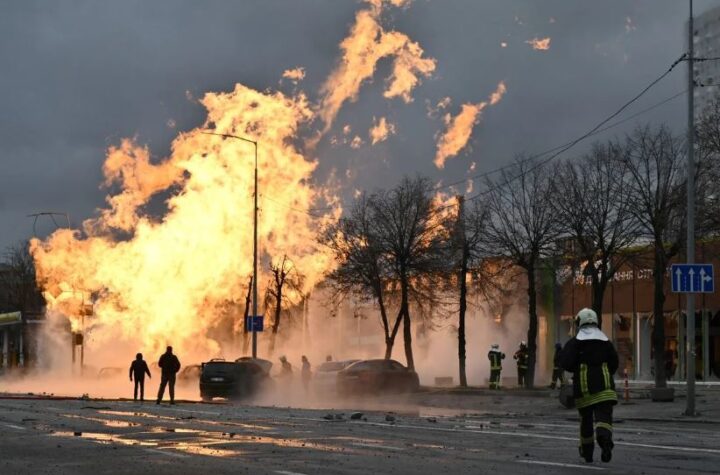
Quietly posted in the small hours of last night in The Guardian, a devastating article detailed the threat of a looming global financial collapse.
This was preceded a few days ago by a story in the Los Angeles Times which warned that a key source of corporate cash was seizing up amid a coronavirus credit crunch.
The New York Times ran a piece by investor Ruchir Sahrma entitled “this is how Coronavirus will destroy the economy”.
The Financial Times was asking back on March 11th as to whether the Coroanvirus would trigger a corporate debt crisis.
The piece in The Guardian had been completely buried under rolling Corona coverage by morning, but this is madness as the two crises are utterly entwined and each will make the other much much worse.
Don’t imagine for a second that the contagion of a corporate debt crisis will remain contained to boardrooms and stock exchanges – if it goes bad for them it will swiftly go worse for us.
CNN was warning that $19 trillion worth of risky corporate credit was swaying dangerously close to collapse on March 14th and the situation is getting worse every hour as international lock downs multiply and increase in severity.
Now tactfully tucked away in a small corner of its Economics section the Guardian’s headline quote was grim:
“A worldwide credit crunch triggered by the coronavirus will set in motion a wave of corporate bankruptcies that will make the global financial crisis look like “child’s play”, investors have warned.
With the world’s most advanced economies all entering a shutdown that could last months, companies that have gorged on cheap money for the past decade face going out of business thanks to a huge spike in borrowing costs on international money markets.”
In ordinary circumstances this would be the #1 story around the world – but news portals are punch drunk from covering overlapping Corona disaster stories and so it has got lost in the stacks.
During the last financial crash, the entire global monetary system came within hours of global systemic collapse: only swingeing interest rate cuts and a gargantuan bail out of financial institutions averted total disaster. Billions of people were unaware that the entire system was hours away from empty ATM’s and frozen bank balances: frozen because of an inter-bank payment paralysis and a global collapse in confidence.
This blog has long warned about the world’s swaying piles of debt and the dangers of using digital bank credit (loans) as our primary means of exchange. We have said time and again that one good shove could bring the whole rotten edifice tumbling down. It seems that shove has well and truly arrived in the form of the corona virus.
Let us look at just the UK’s absolutely terrifying personal debt statistics:
- People in the UK owed £1,675 billion at the end of December 2019 and average total debt per household, including mortgages, was £60,213
- According to the office for budget responsibility household debt is forecast to reach £2.425 trillion in 2023-24.
- At the end of December 2019, outstanding consumer credit lending was £224.1 billion
- £2,594 average credit card debt per household in December 2019
These and many other numbers for private and corporate debt in the UK are above and in some cases way beyond the level they were just before the last financial crash.
These kind of numbers are relatively stable when the economy is growing, but a disaster waiting to happen in a recession. The UK has ten million households with no savings and many of those also have credit card and mortgage repayments to make. In a shut down economy many of these debts will turn abruptly ‘sub-prime’ – and we know where that led last time…
An entire precariat is dependent on the gig economy and payday loans: any significant economic slow down is an existential threat to millions of households. Even during the supposed ‘good times’ of these austerity years, the UK has grown record levels of homelessness, child poverty and food banks. What do you imagine will happen in the middle of a global financial collapse?
The overwhelming majority of what we use as money is not created by the government or any central bank: it is created as a digital accounting entry when private banks extend loans.
If you want to understand this process better – go visit the good people at Positive Money.
In a growing economy, new loans can be extended. These increase the overall money supply so that some extra liquidity is (temporarily) available to pay the interest on existing loans. This kicks the can eternally down the road and ensures that debt piles can only ever get bigger until a collapse inevitably happens.
If this sounds like an insane way to run an economy…well it is and it can only ever have temporary periods of stability punctuated by disasters. Vulture capitalists are well aware of this and stand ready to clean up after each crisis and right now they are licking their chops.
Alongside the twin spectres of global recession and record global debt piles stands the grim reality that the tools deployed to avert the last financial crash are no longer available. Interest rates have already been cut to 0.25% in the UK and have little further to fall. No amount of QE can deal with the $19 Trillion worth of bad corporate debt.
Gargantuan financial gifts for the usual suspects are now so politically toxic as to be impossible. After enduring 13 years of austerity it seems unlikely that the UK population will be prepared to swallow monster bail-outs of corporate balance sheets while they struggle to feed themselves.
The potential now exists for the worst global fires of financial disaster ever – and this time around the authorities have nothing left to put them out with. This day of reckoning was always going to come: the baleful flower of thirty years of global neoliberalism.
There isn’t very much that ordinary people can do in such worrisome times – but for what it’s worth, now might be a very good time to withdraw a buffer of cash from your account.
Queuing up outside the 2020 version of Northern Rock during a banking panic would be a nightmare at the best of times …right now it could also be very dangerous.
Since 2013 I have worked between 4-6 hours a day on this Ad-Free site: trying to give a voice to those without the power or agency to speak out for themselves and uncovering truths that well paid journalists in the corporate media dare not utter.
I am a home schooling parent on a low income – paying for the domain, web hosting and security entirely out of my own pocket.
If you found this article useful and could spare us a few shillings to help keep our lights on, it would be very much appreciated.
Thank you in solidarity with all our readers. John Lynch, Editor.




An excellent article that deserves a much wider readership as it strips away the glossy flesh and gets down to the bares bones of what Capitalism is all about and how it needs these financial meltdowns to survive. Since the change in editorship at the Guardian I have had many of my blogs blocked but a couple of day s ago one was published urging Guardian readers to read the excellent article telling the truth about what is actually happening in the NHS as it struggles with the all conquering virus . When the opportunity occurs I shall endeavour to plug your article. More power to your elbow from someone who has been around for a very long time.. BW
DixiesMayor- do you have a link for your Guardian blog please?